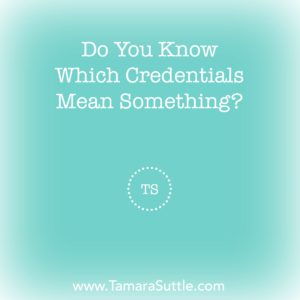Within just a few years of obtaining my license as a Licensed Professional Counselor, I began receiving invitations to grandfather in to organizations (that I had not even heard of) to receive additional credentials.
I (wrongly) thought that since I was licensed, no other certifications would be of merit so I opted to let those opportunities (with the National Association for Alcoholism and Drug Abuse Counselors and the National Board for Certified Counselors) slip away.
Soon after the grandfathering periods expired, those two organizations mushroomed in influence and credibility and I regretted my decisions.
Since then, I’ve also received invitations to join national boards, accrue additional “degrees” and “licenses,” be included in national directories of “prominent therapists” and receive additional certifications from other organizations.
It’s all very flattering at first glimpse.
It’s also easy to see how new therapists can be particularly susceptible to the ploys of these vanity boards and diploma mills.
The truth is anyone including you can set up a board or “school,” provide training in EMDR, hypnosis or any other body of knowledge, and then provide a “certification.”
The training may have surpassed the standards in your profession or it may not.
My point is that if you are new to this body of work, you won’t necessarily know enough to know about the quality of the training.
And, in either case, the certification that you receive may mean nothing.
After contacting the American Counseling Association, mentors and professors across the United States, here is what I know for sure:
- Reputable certifying boards are familiar with the National Commission for Certifying Agencies and have membership in the National Organization for Competency Assurance. Check this out first.
- The certifying board should include prominent individuals in your field and you should be able to research them.
- Reputable boards function to actually meet the needs of the members that they certify. You want more than just a certificate for your wall or directory listing for your money.
- Reputable boards function independently. Certification is NOT contingent upon joining a particular organization; however, they are closely affiliated with professional associations that you belong to. If your professional association does not refer to a certifying board as a resource, you should question why.
- They are typically not-for-profit. Ask and verify.
- Reputable certifying agencies are transparent. They are easy to research including their policies and procedures, established complaint and grievance processes, and codes of ethics / conduct. If you can’t research on line or get a phone call returned in a timely manner, you should be questioning the veracity of this organization.
- Fees for certification should be comparable to those charged by similar certifying bodies.
- Legitimate certifying bodies typically require you to provide proof of attaining certain levels of education and experience. They don’t just take your word for it!
- They often require an exam or submission of a sample of your work to verify that you possess the requisite body of knowledge.
You should question the credibility and motivation of any organization that claims to provide certifications or similar statements of worth but fail to adhere to the above standards.
Such organizations are often shams — more interested in your credit card than your profession and they are known as vanity boards or diploma mills.
Whether you stumble into them unknowingly or choose to use them to pad your vita and boost your ego, the end result is the same.
The general public is misled and you are at risk of tripping on your professional code of ethics.
As a professional in the field of mental health, you are required to display only credentials that mean something.
As such, you need to do your research before thoughtlessly passing along your credit card for another certificate to post on your “Look At Me” wall.

Thanks for posting this useful information. I often wonder how many credntials does one professional need??
Hi, Jill! Thanks for joining the conversation! How many credentials are enough? It really does depend on what you are trying to achieve.
Licensure in your state is typically considered the minimum professional standard for mental health professionals. If you are continuing to build your body of professional knowledge, with or without additional credentials, that is certainly enough.
However, once you accrue a significant amount of knowledge in a concentrated area (like hypnosis or trauma) that is above and beyond the basic standard of competence, credentialing can help to set you apart from the masses. It can also help justify a higher rate of pay for your services.
What do you think is enough?
10 Signs You May Be Dealing with a Diploma Mill- https://www.srmhp.org/archives/credentials.html
(scroll down to bottom of page)
On vanity credentials – https://books.google.com/books?id=AZmEbKKjnEUC&pg=PA123&lpg=PA123&dq=mental+health+vanity+credentials&source=bl&ots=WXUhDX4B6v&sig=AEYIKWqtulbdLXG5GvvGFE071S0&hl=en&sa=X&ved=0ahUKEwictNuu5dDUAhVCyWMKHROnDRcQ6AEIRTAG#v=onepage&q=mental%20health%20vanity%20credentials&f=false
Although this link takes you to a website about credentialing in environmental health, I found this post to be an excellent explanation of the Difference between Credentials and Certifications – https://www.neha.org/professional-development/education-and-training/differences-between-credentials-certifications and thought you might also find it useful.